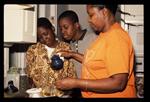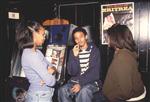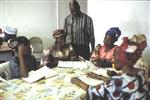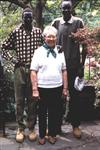Immigration changes roles in the African family for men and women, parents and children, elders and the younger generations.
“In Ethiopia the wife has to take care of the whole house. Here, I cook for my kids, I wash their clothes, I get them dressed. I am the one who takes them to school and then my wife picks them up. In Africa a man wouldn’t generally do that.”
- Ethiopian immigrant“We have tried to make them realize, to understand where they are coming from. Their backgrounds, their beginnings, some of the values of their culture. They consider themselves Nigerian Americans. They have the sense of who they are and they can choose wherever they want to live.”
- a Nigerian mother
Immigrant parents often wish to slow down the Americanization of their children. Loss of authority may be countered by steering one’s children toward those of other immigrant families from the same country.Many community events are multigenerational so that children are exposed to the African model of child-rearing. Churches and mosques are another place where children meet others in their community.
Many African children spend more time at home with their families and are generally allowed much less freedom of movement than their American peers.
“I believe that they might get into trouble. I am trying to work on that and I am not sure what will happen in the future. What they do is that they go to school and after that they go straight home. If they want to go somewhere I take them and bring them home.”
- an Ethiopian father
Some associations run after-school programs for their community’s younger members and summer schools that teach the language and culture of the home country or ethnic group. In this way, the second generation can learn what they may be missing in their day-to-day American life. Families that have the means and come from countries at peace may send their children to the home country for their summer vacation, a kind of “crash course” in the home culture.
Children and youth themselves face many challenges in growing up with immigrant parents. Often the parents are unfamiliar with the roles their children’s schools and teachers expect them to play. Parents may also have little understanding of the psychological distress their children experience in adolescence when “growing pains” are intensified by concerns about cultural identity and belonging.
“So we young people try to keep the culture, but we also know that there is a lot of culture and traditions that we don’t agree with. So you would like to keep some things, like family values and the respect we have for each other, and the closeness we have. Things like that we try to teach.”
- a young Eritrean woman
Despite making new lives in the United States, many African immigrants dream of returning home after retirement. That way, in their old age they would once again be surrounded by their extended family. Refugees may not, however, have this option. Older Africans usually have difficulty adapting to American life, which is much less social and communal than what they are accustomed to.
“My mother came to visit and stayed a year and that was it, because she did not like it. It was isolating for her. Back home, people are in and out of your house, in and out, friends and families are walking down the street. They stop and say hello.”
- a Nigerian immigrant"I don't think I can be an old person in this country. I like the reverence that the youth have for the elderly back at home and the way the community just kind of embraces you. You continue with life in a more gentle fashion as opposed to worrying about Medicaid, if you have heat, and the cost of living. I couldn't grow old here."
-- a Kenyan immigrant






